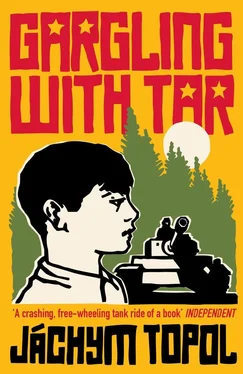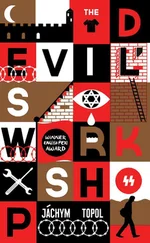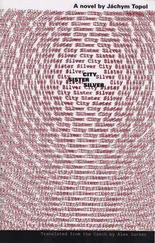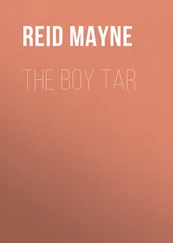One day, just as he’d left us, along comes Još.
I was passing rocks and suddenly, from behind me, I hear Chata saying something in gippo to Još, an old gippo who had a cottage on the other side of the village, where more gippos lived. Chata and Bajza, and sometimes Silva too, would go there whenever they could… Now we all gathered round Još, who was carrying a sack… It was bulging and moving and Još hit it with his stick. I thought it might be a rat, but it was a weasel. Još told us this was what he did. They’d send for him from the village whenever weasels or martens were killing hens and chickens, and then, with their snouts soaked in blood, they’d eat all the eggs too. Još would lay traps for the weasels and sometimes even caught one… only sometimes! Usually not even the village dogs can catch a weasel! A weasel’s fast! It fights like mad to stay alive! Often Još would be given a chicken, even if it was torn ragged and practically dead, and he could always get himself eggs — and that’s not all! When he said that, we all laughed. Then Još shoved the sack with the weasel in it in the deep water under the bridge and held the sack down with his stick by the rocks, and the weasel was completely under water and thrashing about like mad. The sack bulged out in every direction and Još held his stick ever so tight in both hands. The weasel fought long and silently and furiously, then died. Još took it out of the sack. Its paws were sticking out sideways.
Chata and Bajza went to see Još at home and we had to work extra to make up for them, because Commander Baudyš knew how much time we needed to put the rocks from the defensive rampart back into the stream, and if we frittered away the time when we were alone, then we’d really find out what having a tough time meant! And we didn’t want that.
During the damp and rainy days of the thaw Commander Baudyš found a new subject to add to our education: woodwork and metalwork.
In the early days of our training, Commander Baudyš slept upstairs in the nuns’ dormitory, close to Commander Vyžlata and Margash’s command post. Later, though, Commander Baudyš arranged things to suit himself, as he put it. He moved into the kitchen.
He had a bench and saws brought in from a van — tiny hacksaws and fret-saws, and a big saw for cutting beams — and he knocked up some shelves and filled them with little boxes of screws, large and small, wire netting and nails. And the fact of him showing us these things, that was part of our training. And because the ground around the piles of ashes left over from the burnt documents was soft now, some of us dug ash pits, while others, under Commander Baudyš’s guidance, made wire-netting fronts for rabbit hutches or built shelves for jars of gherkins, tomatoes, sweet corn… whatever they wanted in the village! And Commander Baudyš also repaired locks and alarm clocks and pump motors, and could even mend snapped and rusted threshers.
After we’d done a repair job and returned it, Commander Baudyš received food from the villagers, and we all got to eat it, although any bottles of booze were for him and Commander Vyžlata.
We filled the breaks between jobs with lessons. What sometimes happened was that Commander Baudyš would call me and I’d take the bundle of papers out from under my tracksuit top and the boys gathered round and we revised the names of the hamlets and the positions of streams and triangulation points and committed them to memory. Commander Baudyš commended me. He was of the view that I should have a special leather case for my papers to wear at the waist, but that never happened.
It was soon certain that the lads would still be committing the world drawn on my maps to memory when the thaw came. Especially during the time of the thaw I worked busily at my maps. Sometimes I drew the world from reports by this boy or that. I found an old pillowcase. Then I carried my maps in it under my tracksuit top. At night I kept them under my head.
We worked and we learned things from the booklets and from Commander Baudyš’s explanations. In addition to jobs to be done in the village we also worked on installations. That was one branch of workshop practice.
Outdoors it kept raining, and we couldn’t practise crawling all day and every day in the soft mud with airguns and gas masks, though we’d have to in a real combat situation! So we would sit around the stove and watch Commander Baudyš’s hands cleaning a watch mechanism or dismantling a gearbox or applying a soapstone coating to a piston with a fine cloth. In the kitchen-workshop Commander Baudyš never shouted; sometimes he even laughed. We never created mayhem. You couldn’t with Commander Baudyš, but some of us did talk to him. And one evening, Páta coolly asked, ‘Commander, why’s the boy painted next to Fedotkin a Czech?’
And Commander Baudyš looked at Páta, who was both slitty-eyed and a darkie, and he said, ‘Because we happen to be in Czecho. Don’t you worry about it. But in the starvation huts of Vorkuta… that, my lads, was international, there you had every type of mug, like here.’
But Páta stamped his foot and said, ‘Even so!’
And Dýha whooped, ‘Ha, ha! The gippo cowboy!’
‘Yob!’ said Páta, and Dýha was about to lash out when Páta tossed a cloud of sawdust in his face. Without looking up from the huge bowsaw he was oiling, Commander Baudyš said, ‘Orderly, discipline the men!’ and Karel struck Páta in the midriff and stuck his chin out at Dýha, and the lads sat down.
When it rained we worked. We also learned things from Fundamentals of Close Combat , acting out the positions in the book’s drawings. We were soon at the last lesson. We trained by the book both outside and in the kitchen-workshop, where it was warm because of the stove.
I did some thinking about whether I’d rather go with Margash to join the Legion, or to his country.
In Margash’s country there would be no village houses in the sleet; no Chapman Forest full of animals just waiting to rip a boy limb from limb. It was a bright place, with grass everywhere. As I worked away at my the task I had been set I thought up ways to fool about in the grass: me, Margash and Margash’s brothers. I enjoyed those workshop lessons held in the kitchen when it was raining.
One evening we learned the truth about Fedotkin. Commander Baudyš told us the story of the end of Fedotkin.
We were making a set of rabbit hutches and Commander Baudyš said, ‘That’s right, keep learning, lads. You know what they say: golden Czech hands. How could I have made it all the way here from that bloody camp at Vorkuta without ’em? That time we were freezing and helpless in the huts of the penal colony at the mercy of the cruel Soviet Russians. Yes lads, and if you think a Russian like that would sweep the flue of a smoking stove, bollocks! He’d just kick it. And when it was minus forty, who do you suppose sealed around the flues in the huts of Vorkuta to keep out the cold, eh? Aye, that was some cold, let me tell you, that time we set out from Buzuluk, meaning our entire Czechoslovak Army Corps… If you didn’t wrap your foot-rags properly, you died in the ice and frost. And if a transporter got stuck, who was on hand? Or if a belt snapped and a half-track gave up the ghost, who did they call for, eh? “Baudyš, fall in!” So you see, you lot, learn how to handle a hammer, learn how to work. It’ll come in handy one day, believe me!’
We did believe Commander Baudyš, and he was highly pleased and satisfied with us in our workshop lessons.
On many an evening he told us stories until we were quite worn out and until work ended, and in the dormitory his voice was replaced by the voice of Commander Vyžlata, telling the story of Fedotkin and the Czech boy.
Читать дальше












